Are you moving to South Korea and looking for advice and tips before hopping on the plane? Or perhaps you’re unsure whether a move to Korea is a good decision to make.
I was in the same boat. But I took the plunge after landing a job teaching English in Korea. So, I bought a one-way ticket to Seoul, packed everything I had into 2 bags, said goodbye to my friends and family, and moved to Korea.
It was one of the best decisions I’ve ever made. Here are things to know before moving to South Korea!
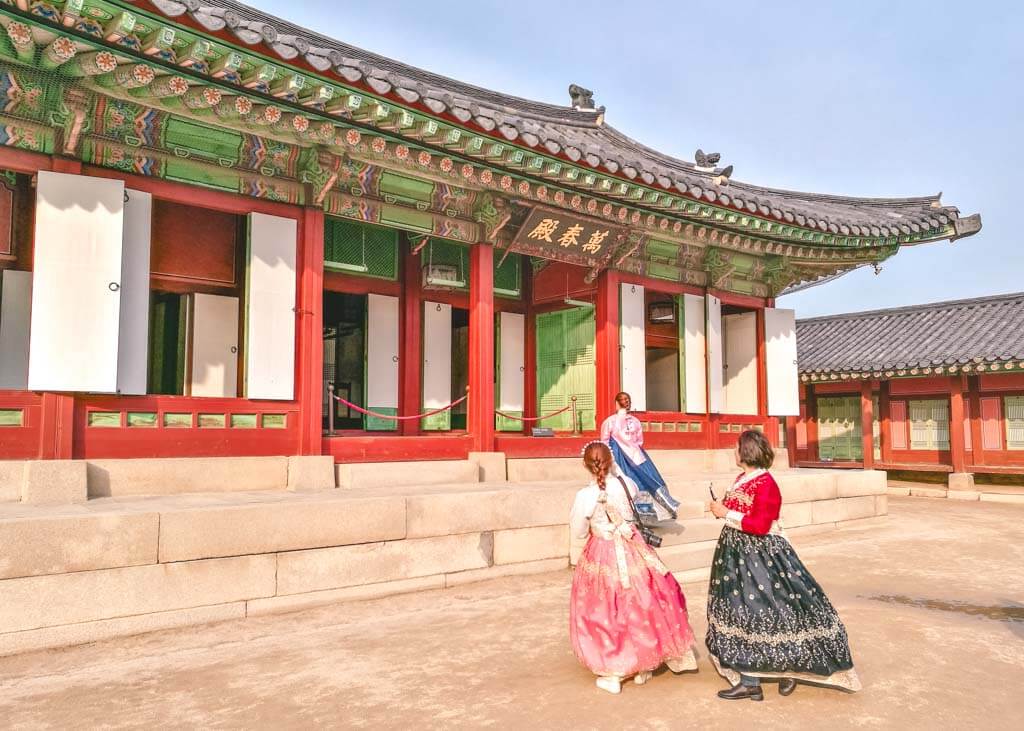
Quick Navigation
What You Need to Know Before Moving to Korea
Korea is an incredible place – if you give it a chance
After my first week in Korea, I had instant regrets and thought to myself “what have I done”.
My first impression of the country wasn’t as I expected. Everyone was in their own world, in a rush to get to work, to the shops, to the bus. It was go, go, go! I wasn’t met with smiling faces – instead, everyone had their headphones on, eyes peeled to their phones.
And then I arrived at a local restaurant, excited to eat the delicious Korean food I had heard so much about. But I couldn’t read the menu, nor communicate with anyone, so I ordered what looked like a good option from the pictures on the menu.
It was not! After having two bites of what I believe was pig trotter, I instantly questioned whether I’d survive a year in South Korea.
But a few weeks later, after learning more about the culture and the people, I realized that I had been too quick to judge. What’s important is to appreciate our differences, understand where they come from, and have patience and respect for the culture and traditions of other countries.
There are so many great things about living in Korea, from the safety to the natural beauty, the incredible public transportation system, and the kind and caring Korean people.

… But there are a few strange things you’ll need to get used to
“The toilet paper goes where?!” Yep, it goes in a trash can, not the toilet itself.
And you don’t hug or shake hands with friends or colleagues – you bow.
Another fun fact – Koreans are a year older than the rest of the world, and they all celebrate their birthdays on the same day, January 1st. Why? Well, babies are considered to be one year old the moment they’re born. This is because the Korean age considers the time spent in the womb!
You’ll have to learn the language if it’s a long term move to Korea
Before moving to Korea, I didn’t realize that there would be so few people who could speak English.
If you’re living in the countryside or in smaller towns, like I did, it will help to have a basic understanding of the Korean language. The Korean writing system, Hangul, is a simple and easy-to-learn alphabet and it will make your life so much easier.
As an English teacher, I wasn’t expected to be able to speak Korean – and I spent most of my time blogging about my epic adventures around Korea so didn’t have time to learn a new language. But had I made the effort, I’m certain that I would have built stronger relationships with the people within my community who all seemed so lovely, but unfortunately, I wasn’t able to communicate with them.
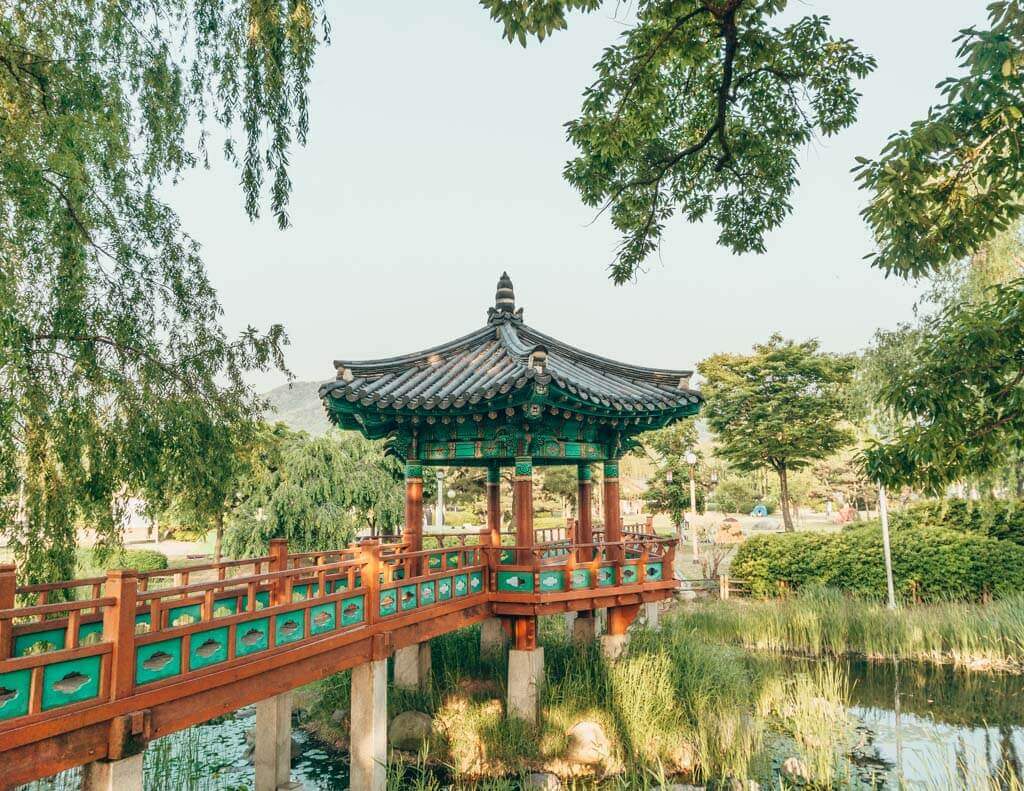
The food really is amazing – if you have minimal dietary requirements
Korean food is so good! And despite my first disaster meal, I quickly fell in love with the tasty goodness of Dalkgalbi, Jimdak, and Korean BBQs.
Most meals are suited for sharing so they’re great for couples and groups of friends having dinner together. But not ideal if you’re moving to Korea by yourself or you want to go for a quick meal alone.
Also, for those with strict dietary requirements, you may struggle to find what you’re looking for as most meals have some form of meat or seafood, including stocks and seasoning. But this is changing, and Seoul has seen an increase in restaurants catering to vegans.
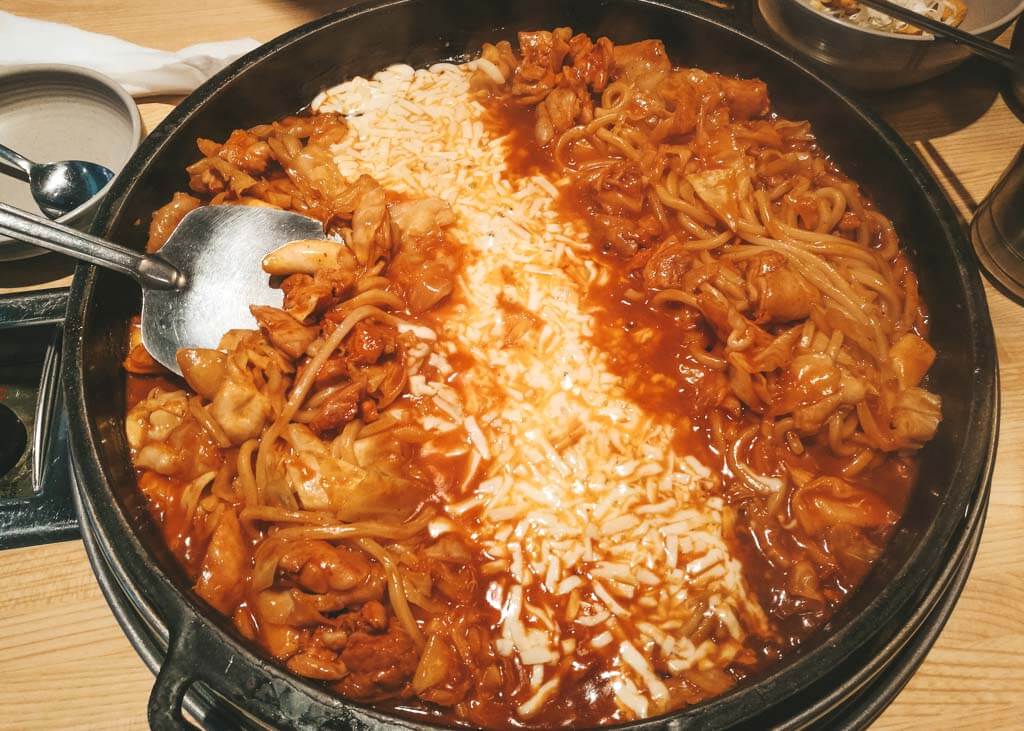
The weather is extreme
This is one thing I just couldn’t get used to.
The summers in Korea are excruciatingly hot and humid. So much so that it’s uncomfortable to be outside. In contrast, winter is freezing cold and icy.
If you’re someone who enjoys spending time outdoors, you’ll love spring and fall as those are the only times you’ll actually want to be out in nature!
So, if you’re packing for your move to South Korea, you’ll need to include appropriate clothing for all seasons. Everything from warm coats, boots, scarves, and beanies to skirts, dresses, shirts, and bathing suits.
For more information, check out my guide on what to pack for Korea.
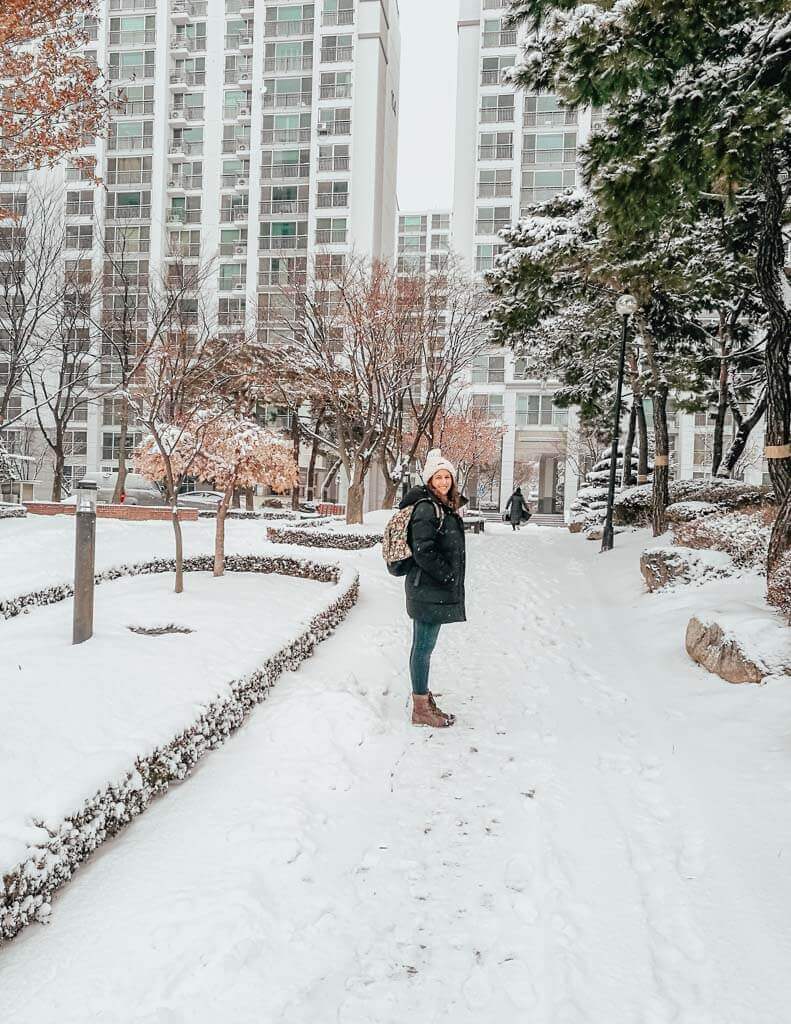
You’ll work hard and you can’t complain about it
South Koreans work exceptionally hard and for long hours, often including weekends. The country has one of the fastest-growing economies in the world, but it makes you wonder at what cost does this affect the people who make it possible.
Stress in the workplace often leads to depression and anxiety but the competition is tough and so Koreans continue to put in the hours to increase their output.
The law recently changed, reducing the work limit from 68 hours per week to 52 hours per week – which is still very high.
Before signing your work contract and moving to Korea, make sure you know the environment you’re getting into. Do you have set hours? What are they? What do other foreigners working at your school or company have to say?
Most schools will include your teaching hours in your contract. This shouldn’t be more than 40 hours per week, but if you’re moving to Korea for other work opportunities, prepare to work long and hard to keep up with your Korean colleagues.
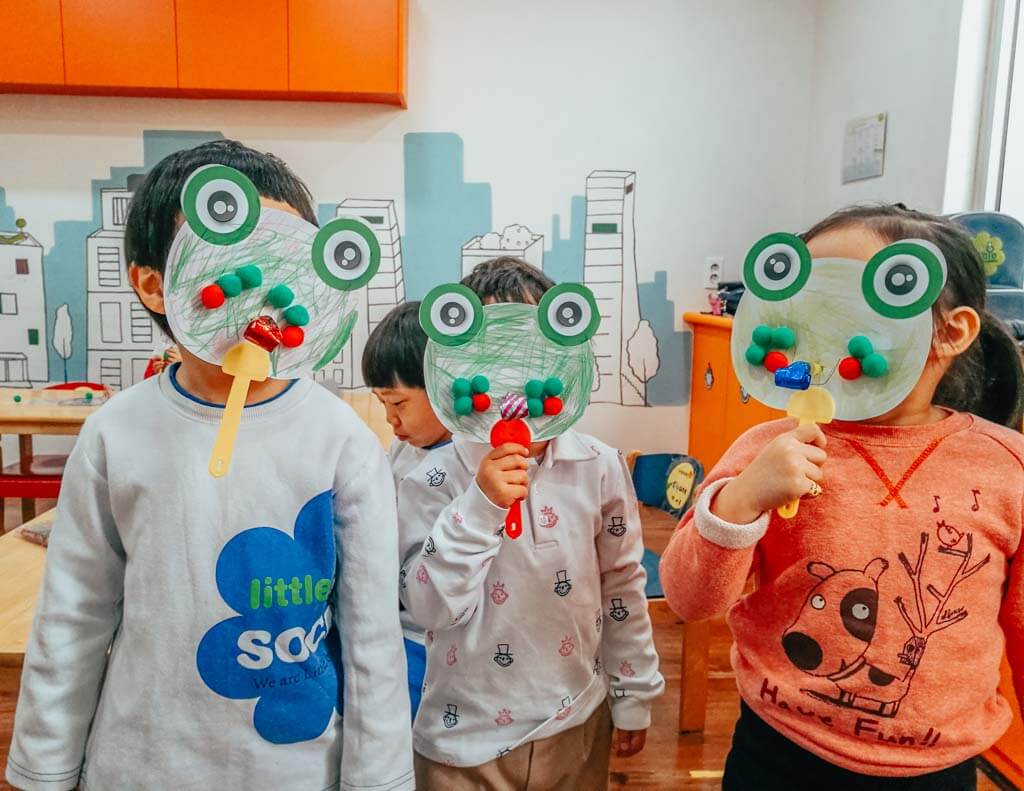
Know what to expect in terms of the cost of living
Korea can be an expensive place to live, especially if you move to the capital city as there is so much to see and do in Seoul. Your biggest monthly expense will be your rent, but as an English teacher, this is paid for by your school.
If you regularly go out drinking and eat lots of meat and western food (which are all expensive), it will add up.
But if you’re trying to save money by moving to Korea, you certainly can! Stick to eating Korean food as this is much more affordable and limit your drinking. Also, keep an eye out for specials at the supermarkets as there are often buy 1 get 1 free promotions.
READ MORE: WHERE TO STAY IN SEOUL
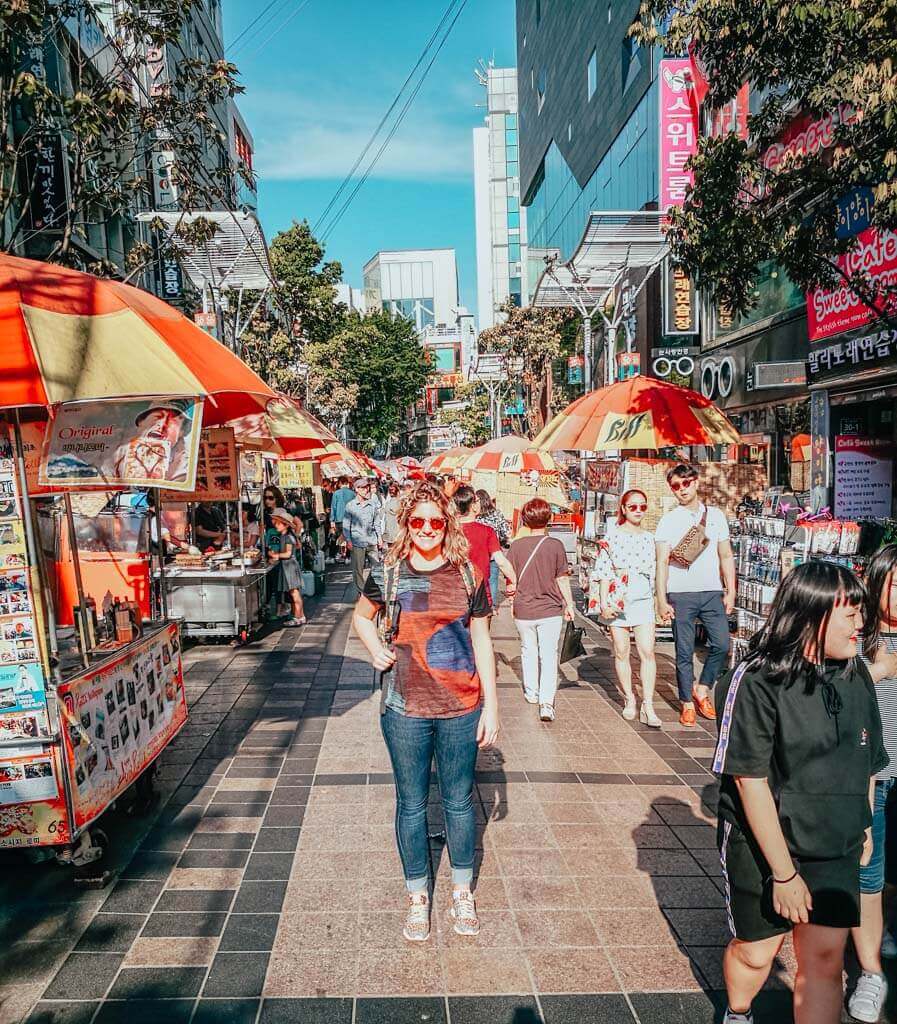
Tipping is seen as a bad thing – don’t do it
Tipping is not customary in Korea and so it’s not expected. On the contrary, it can be seen as offensive if you offer a tip.
Koreans believe that offering good service should be standard and so there’s no need to leave a gratuity.
You’ll live in a tiny apartment
The apartments in Korea are tiny and compact. Expect to pay a small fortune for a big, spacious property.
Living in such a small space was quite an adjustment when I first moved to South Korea, but I quickly got used to it.
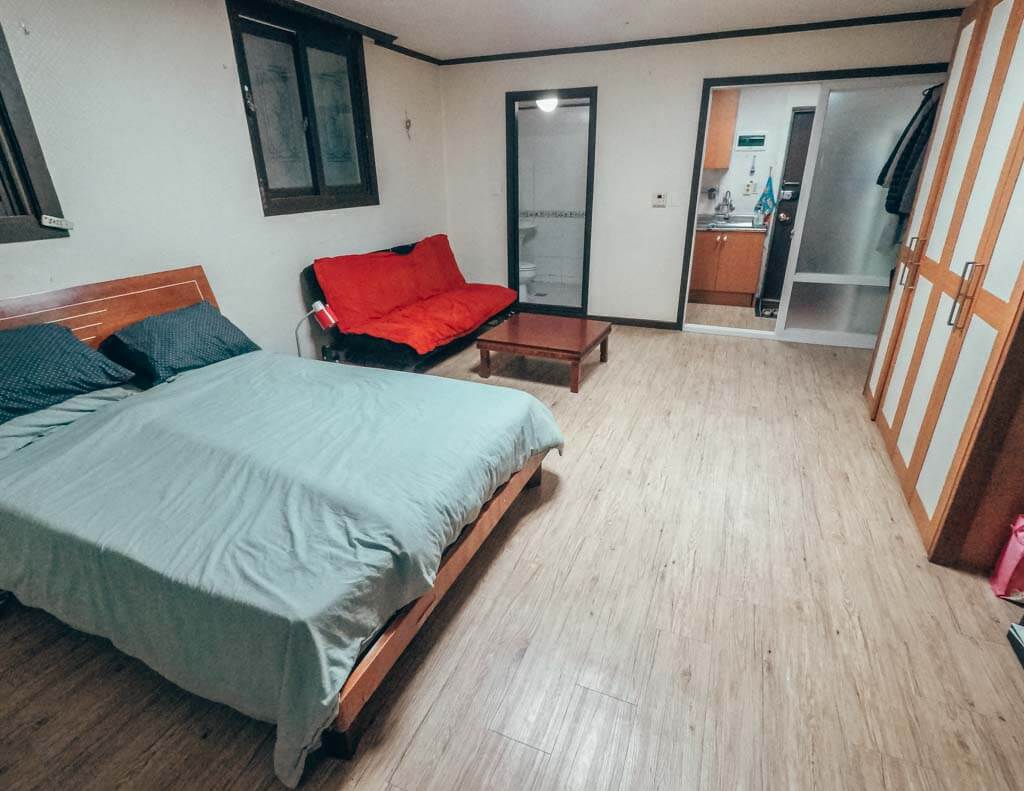
What to Do After Moving to Korea
You must apply for a Residence Card
After arriving in Korea, you’ll need to apply for a Residence Card, formally known as an Alien Registration Card (ARC). This is a form of ID for foreigners who stay for more than 90 days in Korea. Whether you’re studying or working, you’ll need to have one.
After you’ve arrived in the country, you can apply for your Residence Card here. You’ll need your passport, a passport photo as well as proof of residency to complete the application.
READ MORE: EVERYTHING YOU NEED TO KNOW ABOUT TEACHING ENGLISH IN KOREA
And then set up a bank account
Once you’ve received your Residence Card, you can set up a bank account. Kookmin Bank, Woori Financial Group, Shinhan Financial Group, and Hana Bank as the leading banks in Korea.
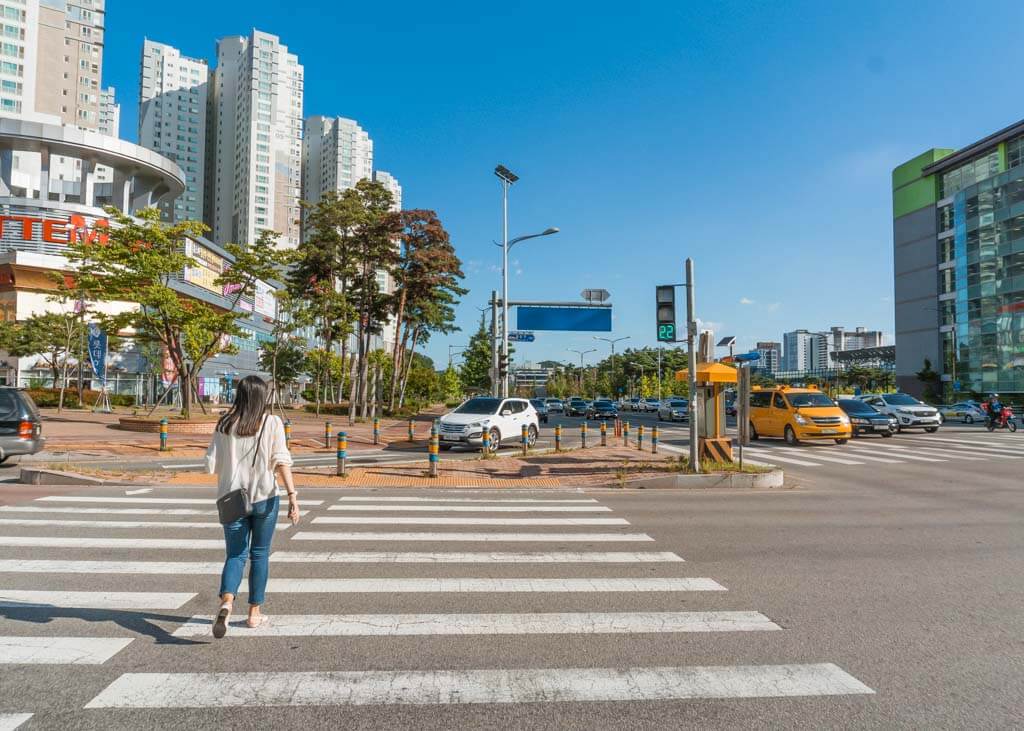
Make sure you download these apps
- KokaoTalk: This is Korea’s version of Watsapp
- Subway Korea: The go-to app for navigating Seoul’s subway system
- Naver Maps: Google Maps doesn’t work too well
- Google Translate: This app is amazing and has tools so that you can hover over a menu and it will translate Hangul to English
Get a T-money card
A T-Money card is a transportation card that gives you access to all public transport across the entire country.
You can easily buy this from the train and bus stations or one of the many convenience stores such as CU or 7-Eleven. You’ll spot the cards by their quirky and cute designs.
Know where to shop
GMarket is like the Amazon of Korea and is the leading site for online shopping.
Groceries can be purchased from Homeplus and Emart (pronounced Eeeee-maa-tah) Both have foreigner options, but these can be expensive.

Tips for Moving to South Korea
Decide where you want to live, and then apply for jobs
Many foreigners who move to Korea prefer life in the bigger cities. They’re far more foreigner-friendly and English is commonly spoken by the Koreans who reside here.
These cities also have a variety of western food options and creature comforts that you may miss from back home.
Seoul is the capital and the most foreigner-friendly place to live, hence it’s a popular choice for those looking to make the move to Korea. Busan is the second-largest city located along the coast and is also a crowd favorite due to the beaches and relaxed atmosphere.
Inland you’ll find Daejeon and Daegu which also offer a big city environment.
READ MORE: 24 STRANGE THINGS ABOUT LIFE IN KOREA
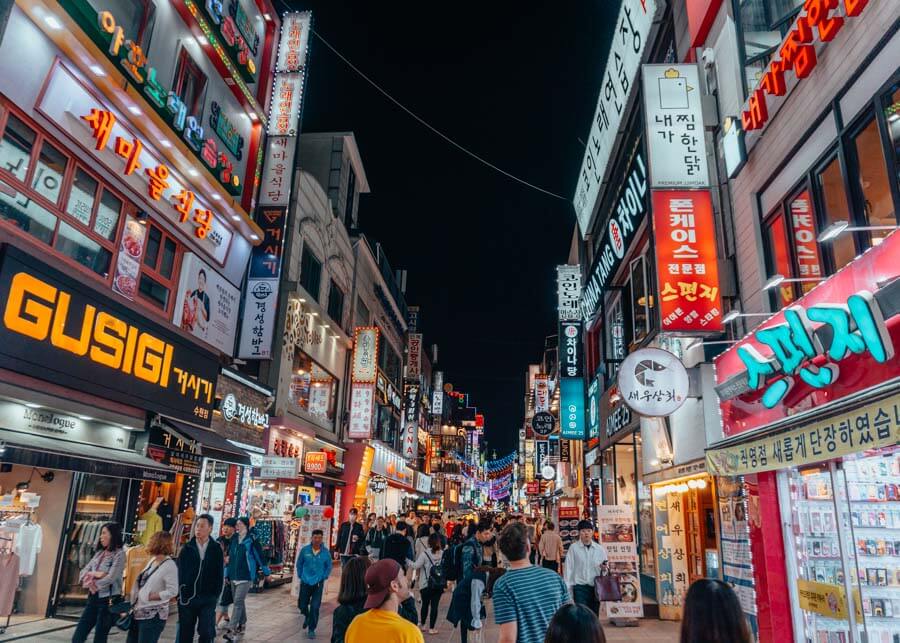
…but don’t write off moving to the rural areas
When Koreans speak of rural cities, they aren’t referring to small farming towns with little infrastructure.
These rural areas are still well-developed towns or cities with good transportation systems, shopping malls, and schools.
They’re just smaller cities that aren’t necessarily as foreigner-friendly as the likes of Seoul and Busan. Communication may be an issue and you will struggle to find a wide variety of western restaurants.
These smaller towns run at a slower pace, and you could go for days without seeing a foreigner. Living in these towns can be lonely and boring for some. However, this allows you to really entrench yourself in the Korean culture and their way of life. It also forces you to get out of your comfort zone and make an effort to meet people in your city.
READ MORE: WHERE TO STAY IN BUSAN: THE BEST NEIGHBORHOODS TO VISIT
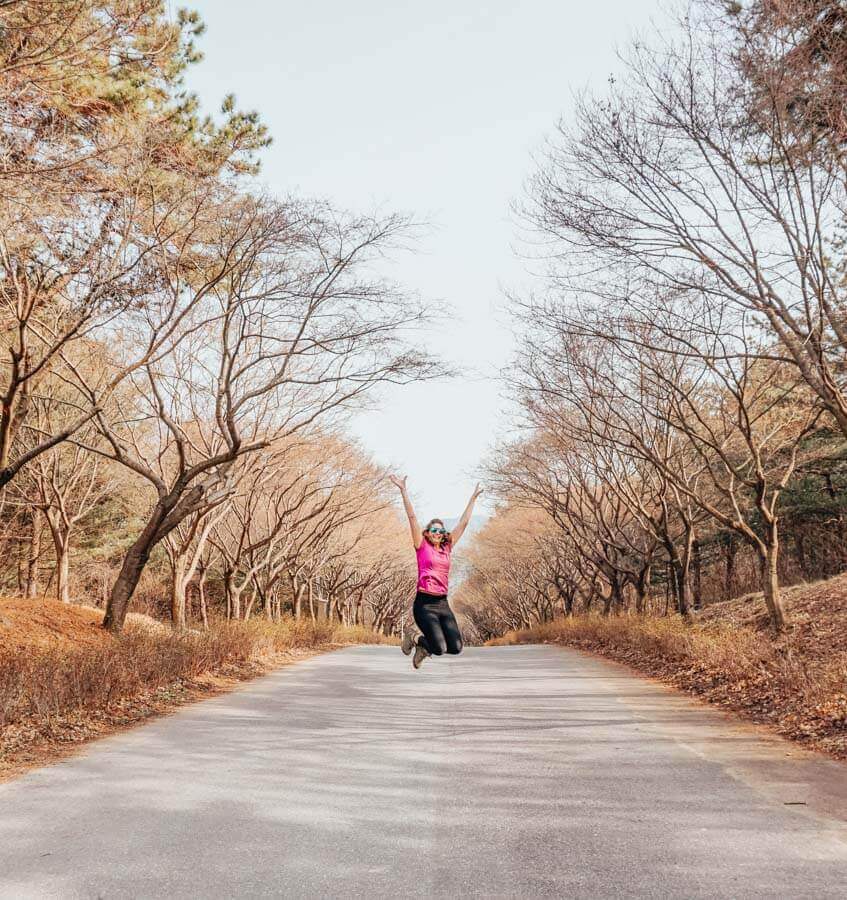
Get travel insurance for the first few weeks
If you’re moving to Korea to teach English, your school legally has to provide you with health insurance (this is one of the main benefits). However, this may take a few days or weeks to be set up. You will still need some form of insurance that will cover you from the time you leave home until your health insurance in Korea is set up.
With World Nomads, you’re able to specify the number of days you need to be covered for and if there are any flight delays, lost luggage, or accidents, they will cover all of your expenses including hospital bills.
READ MORE: 17 THINGS I LOVE ABOUT SOUTH KOREA
Join Facebook Groups before you move to South Korea
There are scores of Facebook groups that will help with your move to Korea. These groups are great for support, especially during your first month where you might be homesick or struggling to find your feet in a new city.
People ask the same questions you’re wondering about and share both the struggles and joys of moving to Korea.
I also recommend joining groups that are focused on your city or activities you enjoy so that you can get out and meet people.
Here are a few Facebook groups I joined.
- Expat women in Korea
- Every expat in Korea
- South Africans in South Korea
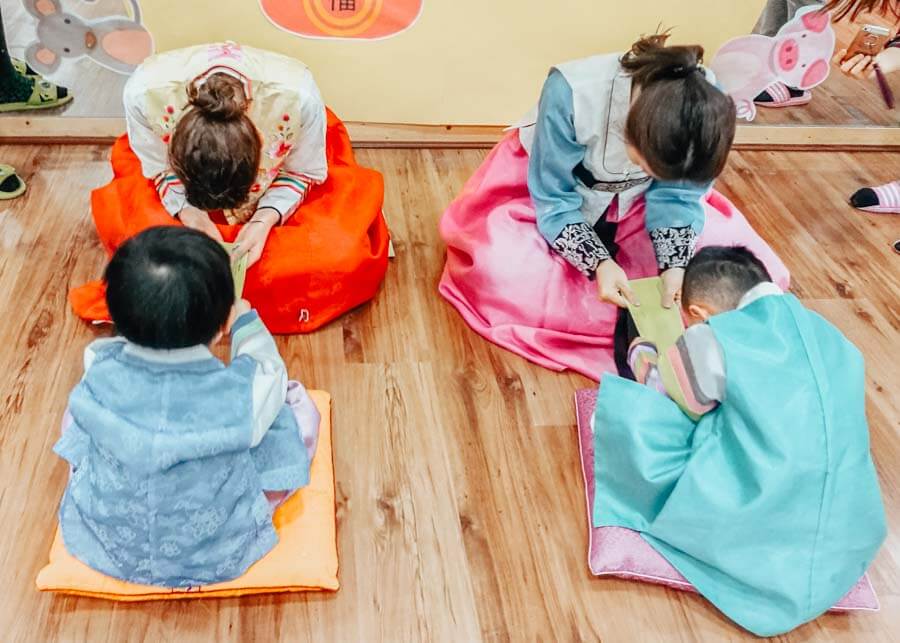
Bring enough money for the first month
If you’re part of the EPIK teaching program, you’ll be given an allocation (around $250) to help you settle into your new home. Unfortunately, if you’re teaching at a Hagwon (like I did), you won’t be so lucky.
You’ll only be paid at the end of the month so bring enough cash (I recommend $400) to cover your food and transport for your first month in Korea. This won’t cover the cost of rent, but this should be provided by your school.
Will You Regret Moving to South Korea?
You never know until you try!
Everyone will have a different experience when moving to Korea. The job you have, the colleagues you work with, the city you live in, and your willingness to explore Korea and make the most of your move will determine your happiness.
It might be difficult at first, but remember that the expat community in Korea is growing.
Are you planning your trip? Have any questions about moving to South Korea? Drop me a message in the comment section below!
Looking for more Korea travel inspiration? Check out my other posts!
- 11 Best Ski Resorts in Korea
- 10 Things You Need To Know About Korean Bathhouses (Jimjilbang)
- 9 Awesome Day Trips From Seoul
- Should You Get laser Eye Surgery in Korea
- 29 Things You Need to Know About Backpacking Korea
Did you find this post helpful? Save it for later on Pinterest!
There is a really good chance that this post contains affiliate links. If you click one of them, I may receive a small commission at no extra cost to you. As always, views are my own!

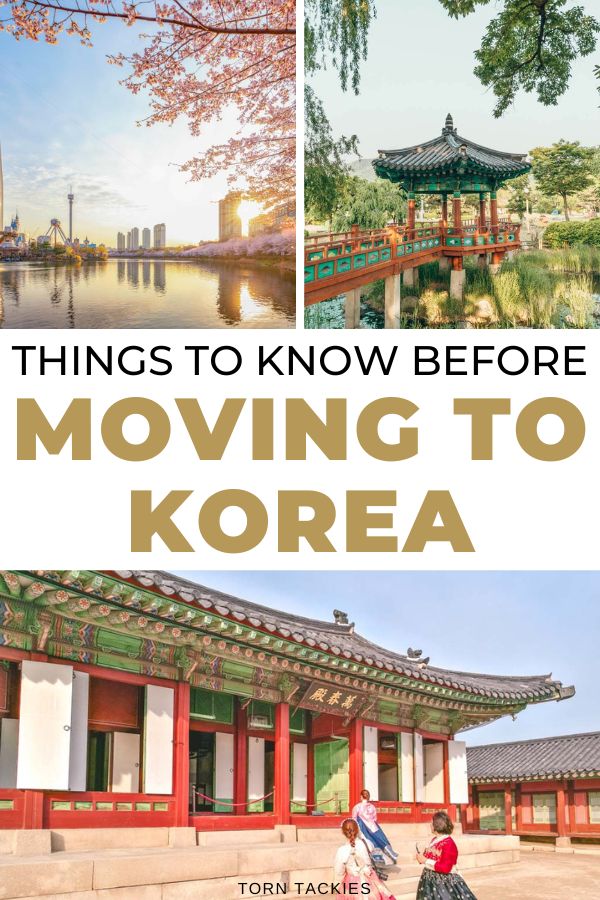

So I thinking about to Korea in 8 months to a year!! I’m really trying to figure out as much as I can about Korea before I go so I don’t make too many mistakes. I only taking up/ teaching my Korean so then I will have an easier transition in Korea! So you have any tips or suggestions that could help me?! Also I’m debating on many things in my head about moving there but the thing is that i love the culture!!
Hi Kayla, I’m so excited for you! I recommend that you start learning the Korean alphabet, Hangul. There are many online sites and apps that can help with this. I also used Duolingo, and if you start now, you will be able to converse with locals which will make your move so much easier. Good luck and have fun.
hello,
I really don’t have a plan to be honest…
I really love Korean Culture, people and food (so far from what I know of course…..)
but I would love to start a new life there, very far away from everyone and everything here. It’s something I always wanted to do since I was a little girl, run away and start somewhere new very far away and Korea would be perfect! And your story inspired me more, that anything can be done when you put your all in it ! I live here in Florida, where do I start?
Hi Brenda, I’m so glad that my story has inspired you! Many people share your feelings and while relocating can be scary, it’s also very exciting! First, you need to decide where you want to live and what you want to do in Korea. Teaching English is a popular choice and you can easily get a visa if you’re an American citizen so I would recommend going down this route first. If you don’t want to teach, you will need to look at other options for getting a long-term visa. This will be the most critical step and once your visa has been granted, you can look at planning your move. Also, join Facebook groups such as “Expat women in Korea”. Here you’ll find lots of information and it’s a supportive community that will give you honest advice. Good luck in planning your move!
So I plan on moving to Korea with my best friend as soon as we finish college! Are there any other jobs besides teaching English that we can look into? I definitely want to do something with music or even dance! We also planned to bring around $5k-$10k each, would that be enough to last us even if we don’t find a job before we move? Also my last question would be, what place has the best food? I love to eat! Thank you for the amazing tips!
Hi Nini, unfortunately I’m not familiar with other jobs in Korea. You will need to look at what visas are available and potential sponsorship by an employee. But music and dance are a big deal in the country so there will definitely be a demand for them. I don’t think you can move there long term without a job so you may need to arrange one prior to arriving, but I stand to be corrected on this. The amount of money you’ve mentioned is more than enough to last a few months, especially if you’re sharing costs for housing. But this also depends on your lifestyle. The best food has to be in Seoul – Myeongdong! The street food there is amazing there. Also, Hongdae is a great vibe with lots of students and a festive atmosphere. This is the best place to enjoy a Korean BBQ or Dalkgalbi! Good luck with the planning and let me know how you go with finding a job.
I’m planning to move there next year. I want to teach English and I’m bilingual Spanish too. And thank you for share all your experience I will read your blog always.
Hi Vanessa, good luck with the move! Thanks for reading.
Thank you for the tips. I love South Korea culture and it’s always been my dream to visit there one day. I would love to relocate there for some years too. I’m a graduate of English Language and Literature studies. A Nigerian too. I was hoping I could do my Masters degree in South Korea. Do you think it’s possible?
Hi Precious, I hope you visit South Korea – it really is a fascinating country! I’m not familiar with the visa requirements for studying in Korea, but I am sure it is possible. It’s best to join ex-pat Facebook groups or University discussions. Let me know how you go and good luck with the move!
Hi greetings… Just read your auricle, you’re really wonderful, your detailed explanations has already given me a clue. Thanks!
Then my question is, I don’t want to teach English, I’m still an Under graduate. So, would it be possible to get a company that would employ me to work.. Where do I start ? How do I find the companies? I’m really interested.. Thanks! Looking forward to seeing your reply!
Hi Godson, it’s so exciting that you’re looking to move to Korea! Unfortunately, I don’t know enough about employment opportunities outside of teaching English. I recommend joining a few expat Facebook groups and asking for advice there as I’m sure there are many people who are in the same shoes as you. All the best, Carryn
Hi! I am considering getting my TEFL certificate and applying for a teaching job in South Korea, your blogs have really helped! I wanted to ask if you had a degree first then got your certificate on top of that? If I don’t have a degree is that okay or will that hurt my chance of getting a job?
How long did it take you to find a job after applying?
Thank you for your help I really appreciate it!
Hi Hannah, a requirement to get your Korea work visa (to teach English) is that you have a degree from an English speaking university. Unfortunately, you won’t get a job if you don’t have this degree as they cannot process your visa. If you already have a teaching degree, you don’t need a TEFL certificate. I got my degree first (Bachelor of Commerce) and then did a TEFL course after. I had a few interviews lined up a week after applying for jobs and had signed by contract within 30 days of starting my job search. Carryn
So glad I found your blog. How do I find a teaching job in Korea? I’m Nigerian.
Hi Nneka, here’s my complete guide to teaching English in Korea which includes the minimum requirements. Unfortunately you’ll need to have citizenship from an English speaking country such as South Africa, Canada, USA, Ireland, UK, Australia or New Zealand. However, you can contact the recruiter that I’ve mentioned in the post to confirm whether you are eligible. All the best, Carryn
Hi, thanks for your info and general guidance. I am looking into Teaching in SK, so I reached out to a family friend who was there and is in partnership with a learning centre group. My biggest fear is not being able to survive the first month as I don’t have much savings (any to be honest) so I am hoping to take some basics with me (some easy cereals like Future Life which can be eaten with both milk and water). As a South African, the Rand is not very strong so that is where my fear lies. Do you think R2000 would be enough to cover transport and some basic groceries (e.g. Milk, bread, or yoghurt) to survive the 1st month?
Hi Michael,
Thanks for reaching out. Firstly, you need to confirm the following with your recruiter/school.
– Will your school be purchasing your flights to Korea? (My flights were arranged by my school, but some people have to buy their own and then their school reimburses them)
– Will your school director fetch you from the airport? Or arrange your bus ticket to the town (if not Seoul). This may be an additional expense that your school should cover, but may reimburse you.
– Will your school pay for your medicals in Korea? These are done in the first month. My school covered this cost, but I’ve heard that some schools don’t.
– How close is your accommodation to the school? This should be within walking distance so you won’t need to use public transports (unless you’re in big cities)
If all of the above are arranged by your school, then you will only need to cover groceries for the first month. R2000 isn’t a lot but you should get by. If you eat out or want to do activities on weekends, it’s not enough.
Also note the below
– Your apartment should be fully furnished
– You will need to pay to have documents couriered to Korea prior to leaving.
Also note that EPIK programs often give their teachers an allowance to settle in for the first month so you may want to look into this. But they only open their programs twice a year and its easier to find work with a hagwon (public school)
Hope that helps and good luck with your job search.
Carryn